Chatbots in Healthcare: How They're Changing an Industry
What’s most exciting about this technology is where it’s headed and how it’s trending. In this blog post, we’ve categorized chatbots in healthcare by their biggest features. Each of them is a game-changer within the industry.
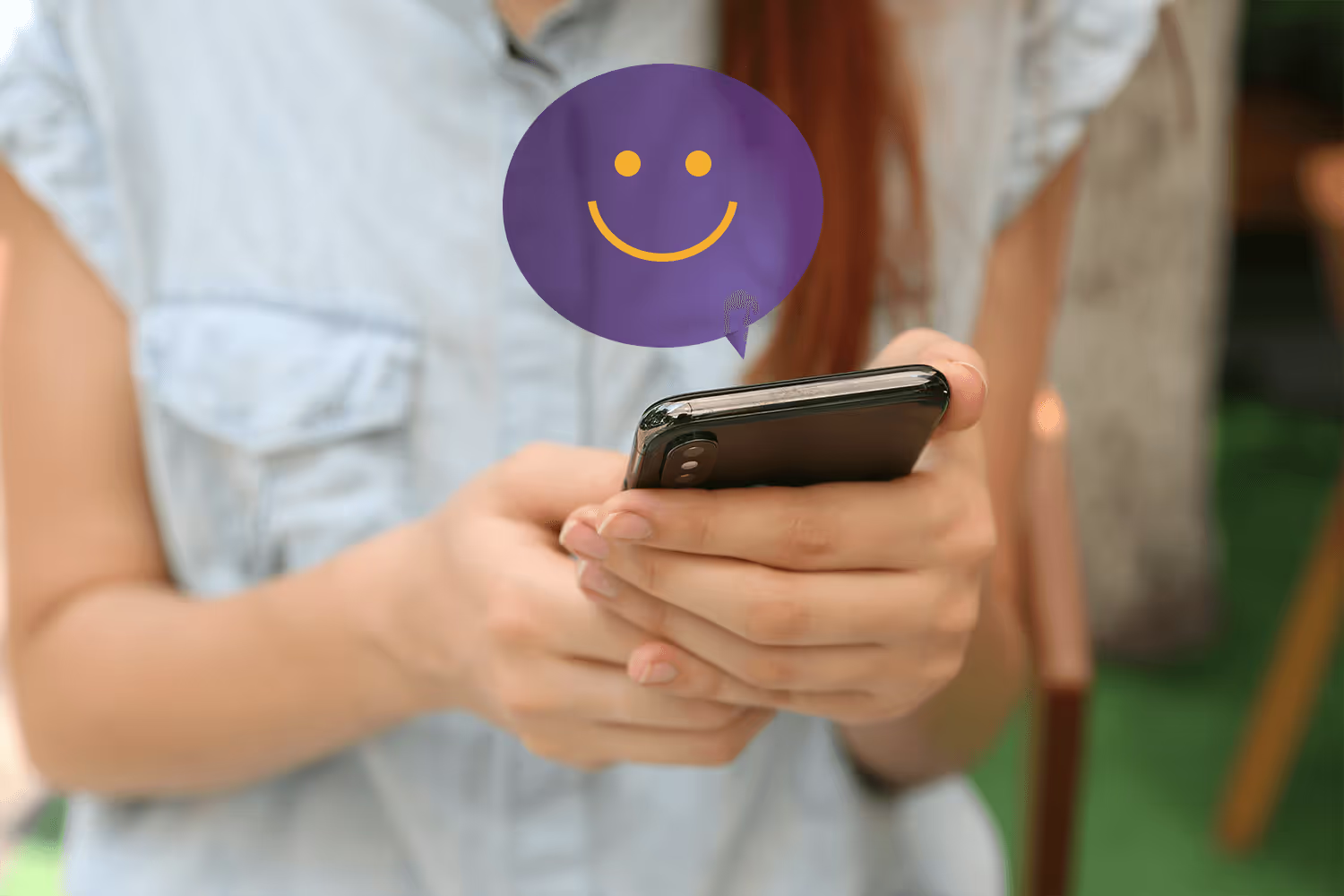
We all rely on chatbots in some way. But it wasn’t always that way.
Do you remember when Apple unveiled that little voice inside your phone, Siri, almost ten years ago in 2010? Before that point, asking your phone to tell you a joke in public would’ve gotten you weird looks. Not to mention the lack of a robotic punchline.
Now if you blurt out a command, a device would gladly answer you. The fact that this can happen at any moment while you’re reading this is a testament to the popularity of chatbots. Sure, the technical term for the Alexa devices of the world is “virtual assistant” if you’re into buzzwords. But these devices are all made possible due to advancements in machine learning.
Some businesses were entirely built on the premise of a chatbot. What’s so great about these technologies, regardless of if whether its a device or an app, is they’re so convenient.
What’s most exciting about this technology is where it’s headed and how it’s trending. In this blog post, we’ve categorized chatbots in healthcare by their biggest features. Each of them is a game-changer within the industry.
Real-Time Healthcare Assistance
Before people go to the doctor, they’ll look up their symptoms. We’ve all done this at one point or another. If you haven’t, you’re in the minority. A study found that 89% of patients Google their health symptoms before scheduling an appointment. You can’t blame people for doing this, not knowing what’s wrong with you the moment you feel unwell is nerve-wracking.
Some tech startups realize this problem and try to solve it with AI-powered messaging.
Sometimes even going to the doctor is a frustrating experience. You’ve felt these symptoms before and know your diagnosis without setting foot in an examination room. Regardless, you’ll still have sit on that paper covered seat before receiving treatment.
Imagine the autonomy you’d have as a patient by being able to reach into your pocket, open up an app, and diagnose yourself by chatting with AI-driven health companion. Exciting, right?
That’s where the future of chatbots is headed and some companies are already there.
Elomia is There for You
Elomia is an artificial intelligence-powered virtual therapist who lives in your phone. The A.I. has the ability to understand, listen, advise, and support users.
The company trained the A.I. used to create Elomia through observations of past therapies. The training used thousands of consultations conducted by doctors.
You can use Elomia to...
- Talk through situations
- Ask questions and seek advice
- Get recommendations on mindfulness exercises
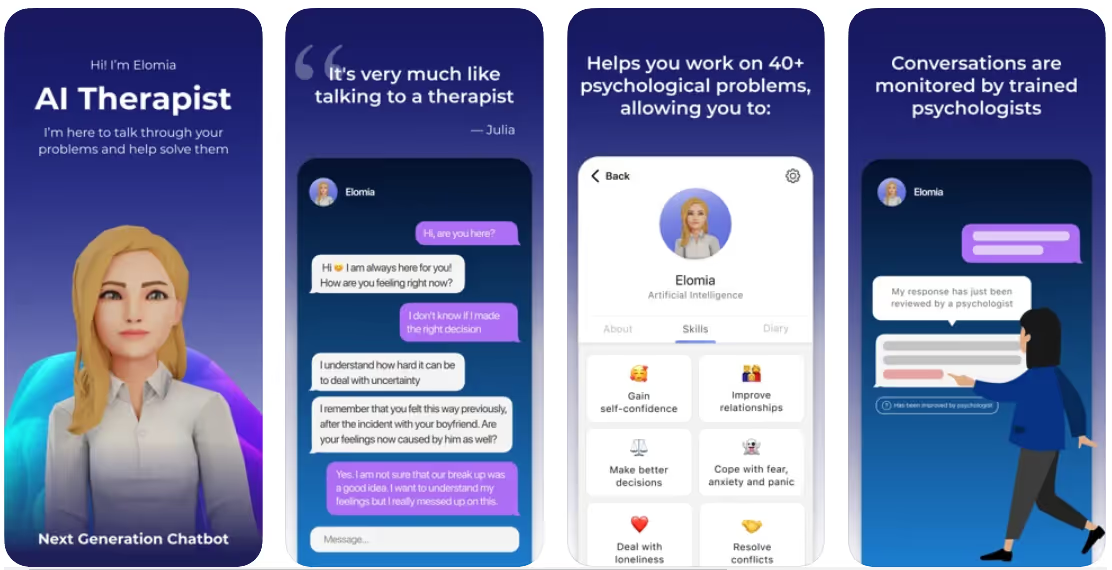
The virtual therapist also has the ability to assist with the treatment of...
- Anxiety
- Depression
- Low self-esteem
- Loneliness
- Relationship issues
- Work burnouts
- Sleep issues
This app is very adamant in stating that it doesn’t provide diagnosis or treatment. The creators specifically state that it does not replace a therapist. The creators have confirmed Elomia can provide permanent support to take care of the user’s emotional health.
Youper's Personalized Conversations
Youper is a mental health app that uses A.I. backed by an army of psychologists and other mental health professionals.
It was co-founded in 2016 by Dr. Jose Hamilton. Dr. Hamilton worked as a psychiatrist in clinical settings for over 10 years and saw more than 3,000 patients. Impressive, right?

So what does it do?
Youper is able to help users with quick and personalized conversations, A.I. style. The chatbot learns about the user as conversations continue and can finetune the conversation and advice it gives to fit the user’s needs.
Youper’s features include:
- Personality assessments
- Mood tracking
- Emotional state tests
- Exercises for practicing gratitude and mindfulness
These features help users develop mindfulness practices and coping mechanisms.
Is it effective? According to evidence, yes.
8 in 10 users reported an improved mood after just one conversation. The app supports people in caring for their emotional health, it doesn’t provide diagnosis or treatment.
Babylon Health Robo-Doctor
Babylon Health designed a chatbot that gives medical advice through a mobile app before coming in for an appointment. They initially released the AI service in 2014 and it wasn’t perfectly accurate.
But, in 2018, the company announced that it’s now more accurate at identifying medical issues than human experts by 9%.
Once the robo-doctor “talks” to you, it evaluates if it’s necessary to transfer you to a video conference with one of Babylon’s full-time physicians. While meeting with a doctor, they can send a perscription to your nearest pharmacy right from the app.
After having an appointment, the application also stores consultation notes.
Ada Health Companion
Ada Health received $47 million in funding back in 2017 for its health companion app.
They’ve released a similar app to Babylon Health but focus more on personalizing the user experience.
Their chatbot stores general health information and past conversations on the cloud so that the technology can learn about each patient individually.
Their app also has the ability to deliver prescriptions to patients or their pharmacy.
Buoy Health Data-Backed Discussions
Buoy Health combines the power of a database of 18,000 clinical encounters with a conversation to help patients diagnose themselves.
What’s more interesting about this company’s app is that they’re planning to partner with healthcare payers and insurance providers.
Once partnered, they’ll whitelabel their app and help guide patients through the right avenue based on their interactions with the bot.
Providing a more accurate channel for patients to “self-diagnose” provides never before seen access to healthcare. These major players in the health companion space all have three common goals…
- Increase convenience within healthcare
- Decrease the time it takes to have an appointment
- Decrease the number of patients visiting a doctor’s office
The healthcare industry will change for the better if each company achieves these objectives.
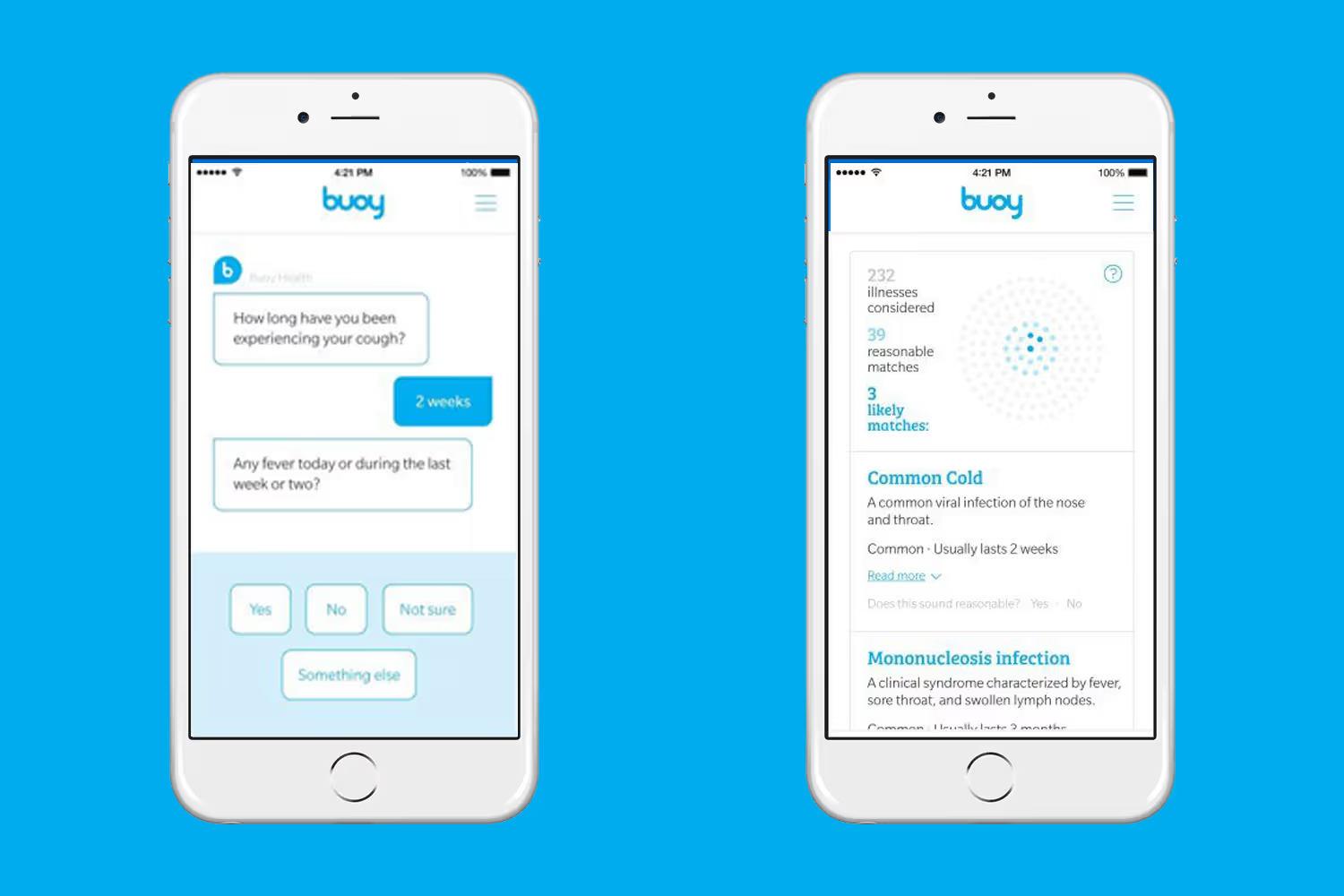
Physicians Could Use Help Too With SafedrugBot
Unlike other chatbots that fall within this category, SafedrugBot steers toward helping physicians. After all, they need help to avoid the burnout epidemic.
SafedrugBot came about from a doctor asking the developer to solve a real problem; determining safe drugs for women while breastfeeding.
The bot has three different commands…
- Information on drugs - provides information related to active ingredients and alternative medicines while citing the source of data
- Active ingredients - gives active ingredients, identifies identical medicines regardless of brand name, understands drug compatibility with breastfeeding
- Alternative drugs - Finds suitable alternative drugs to a specific medicine
Although currently serving a specific niche, SafedrugBot may prove helpful in the future in identifying allergies and helping with foreign country prescriptions.
Content-Rich and Accurate Information
Even after diagnosing yourself, what’s the next thing you’ll do? You’ll go even further down the rabbit hole and look up more specific information about what ailment you have. If it’s bad, you’ll want to learn as much information as possible to heal faster.
This may sound familiar to the last section. But there’s a huge problem with health information on the internet. It isn’t very accurate. A study published in the Journal of Pediatrics found that 56% of websites provide inaccurate or irrelevant health-related information.
Of those websites that do contain accurate information, they’re confusing. Organizations such as The American Academy of Pediatrics (AAP) and The American Academy of Neurology (AAN) publish official medical documentation on their websites.
Doctors publish these documents which ensure accuracy. However, they’re littered with confusing nomenclature and jargon that’s confusing to patients seeking information.
That’s where healthcare chatbots come in.
OneRemission To Rule Them All
OneRemission is an app created by a cancer survivor for patients going through similar hardships. The chatbot’s ultimate goal is to help ease the fight against cancer.
The app features a search engine that provides hand-picked websites to provide helpful resources to cancer patients. Integrative oncologists evaluate each website listed within the database to ensure accuracy.
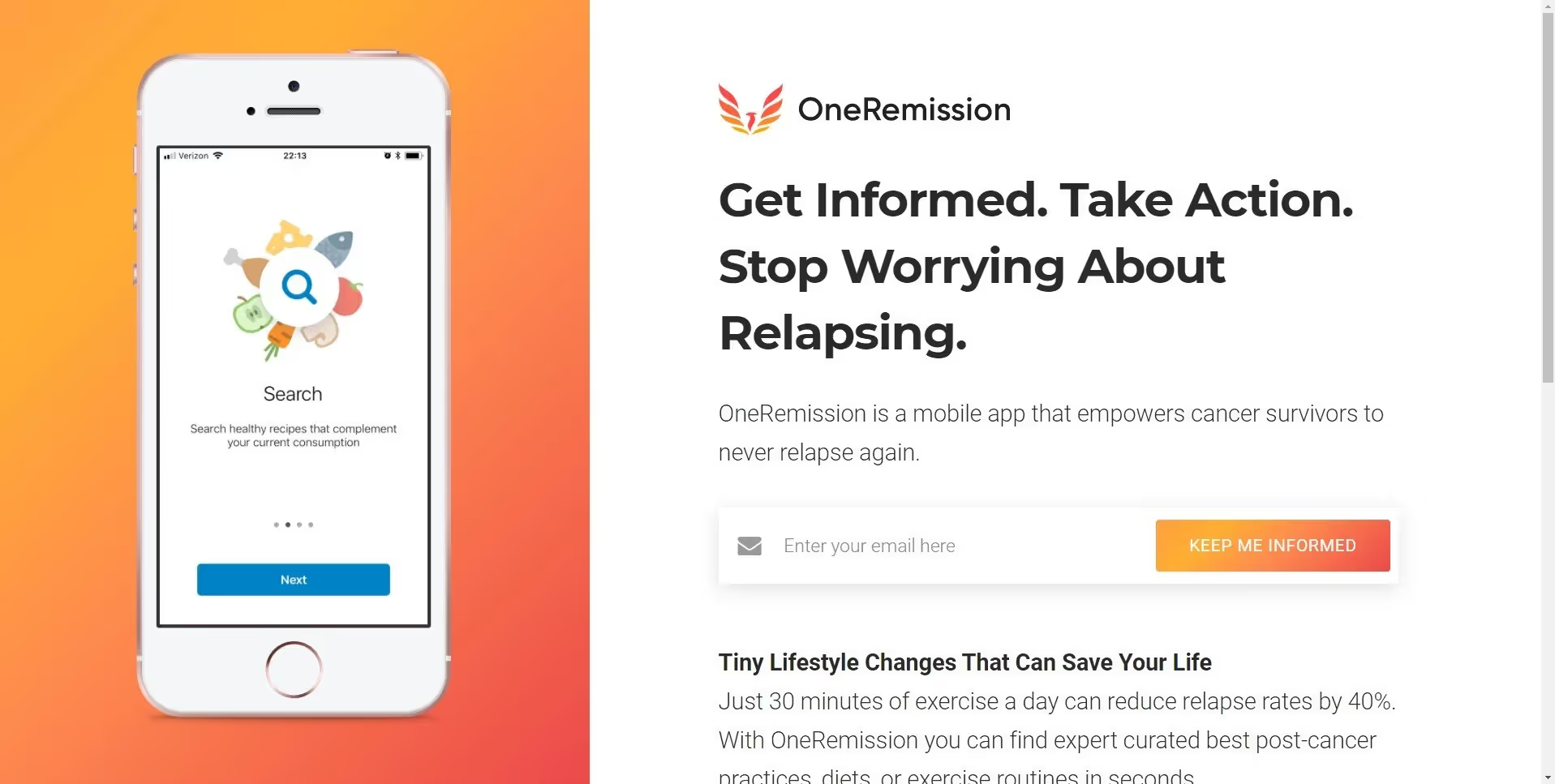
Additionally, OneRemission promises to never disclose someone’s search history and personal information. That’s a good philosophy to have, considering if they did OneRemission would have a serious HIPAA violation on their hands.
The information found in the app includes a comprehensive list of diets, exercises, and post-cancer practices. Integrative medicine experts assemble such lists so that they don’t need to rely on a doctor for everything. For example, someone can search about the cancer-related risks and benefits of food products.
Should they need the help of a specialist, the app lets users consult with an online oncologist 24/7.
CancerChatbot's Wealth of Information
89% of cancer patients go online to seek more information related to their strand of cancer. That statistic makes sense. Getting diagnosed with any form of the disease uproots their entire life. After all, whoever expects that they’re going to get cancer?
But there’s so much information because so many different types of cancer out there. If it’s inaccurate, it makes research even harder for patients.
Jonno Boyer-Dry faced this same problem when diagnosed with Stage IV Hodgkin’s Lymphoma in 2014. He quickly realized how hard it was to sift through the heaping piles of disorganized information about his strand of cancer. Some of the most helpful information he received came from other cancer patients, their friends, and their families via word of mouth.
He decided to take the problem of finding helpful information into his own hands and created CancerChatbot by CSource.
His bot crowdsources the discovery of helpful resources about different cancers, organizes that information, and presents it to patients in an approachable way. Cancer patients reach out to the chatbot through Facebook Messenger and it fetches information from resources within its crowdsourced database.

Your.MD Actionable Info
Although this messenger AI could also fall within the first category within this blog piece, it also provides a database of information.
Your.MD pairs a symptom diagnosis chat tool with detailed verified information on ailments. The best part about it is that its availability, you can find it on…
- Facebook Messenger
- iOS
- Android
- Skype
- Slack
- Telegram
After using the application, the chatbot leads you through its search engine of recommended content based on the results. Instead of forcing you to do countless hours of searching, the bot does for them.
HealthTap on Draft
No medical information is more accurate than what comes directly from a physician. HealthTap is another chatbot where you can request health-related information. Once sent a physician reviews requests and answers through the application.
What’s most unique about HealthTap is its social approach to providing information. The technology takes a social bookmarking approach (think Reddit for healthcare information).
The company actively seeks out doctors to join their community of medical professionals. The community helps answer questions and refines the content through…
- Peer-reviews
- Upvotes and downvotes
- Updating
- Adding more information
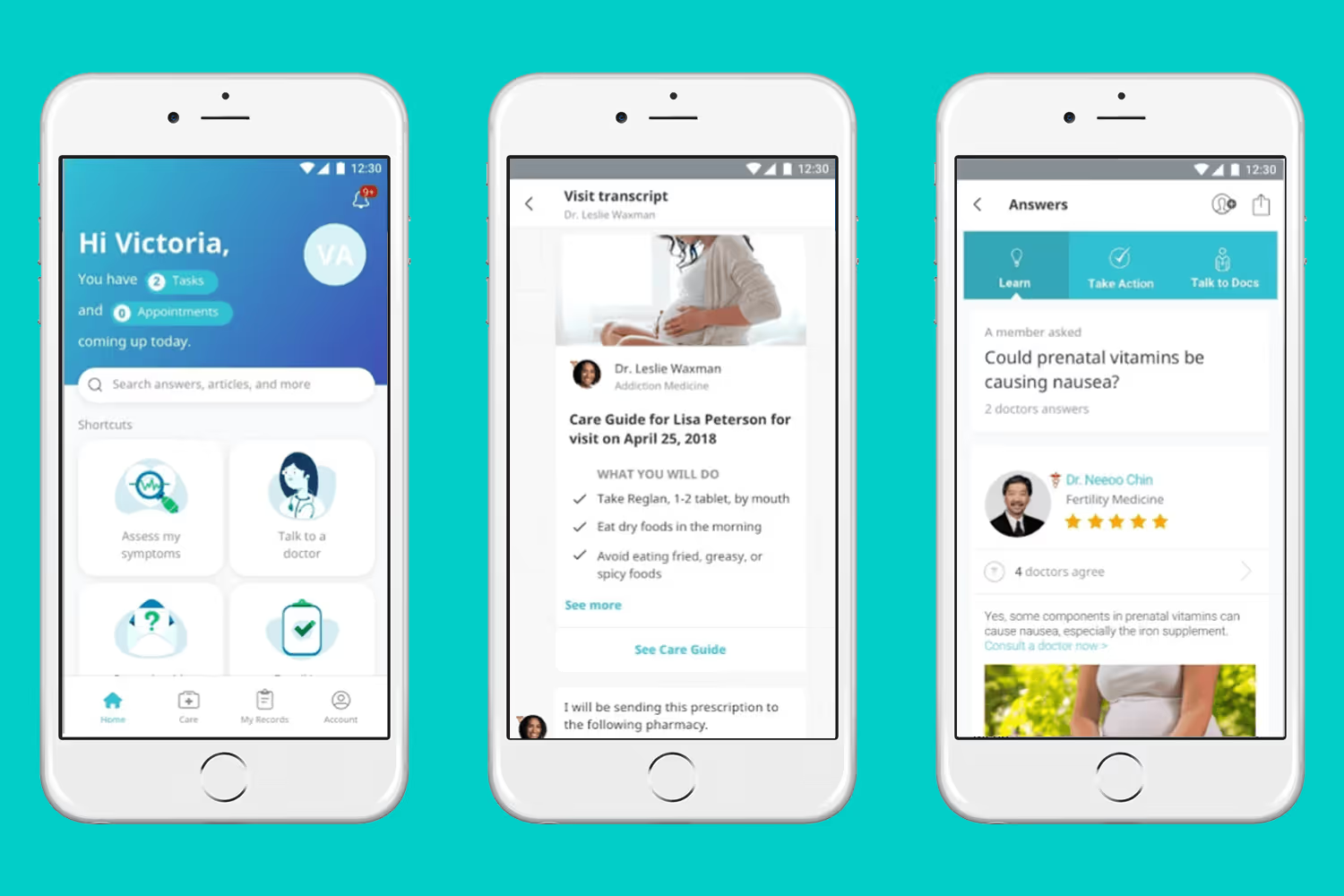
Reminders, Reflection and Mental Health
After getting diagnosed and looking up information on your ailment, you’ll need a prescription. Depending on the illness, you might need to take more than one medication. To make matters worse, each has a different dosage.
Although it’s not impossible to keep track of all of this, it can get confusing. Not to mention we’ve all forgotten to take our prescribed medication at some point. But for some patients, they must keep up with their treatment.
According to a Medical Care study, older patients who don’t take their prescribed medications were 76% more likely to experience a decline in their health.
Outside of remembering precriptions, other complications can arise that require self-reflection.
Enter healthcare chatbots, stage left.
Iona Mind Guides You
Iona Mind, designed for an iPad and iPhone, acts as a guide for “fitness of the mind”. It’s a self help app and isn’t designed for the treatment of psychiatric disorders.
This chatbot specializes in the treatment of the problems. The creators of the app say that other A.I. mental health apps only treat symptoms and argue that this isn’t sufficient.
Iona Mind features scientifically backed tools from cognitive behavioral therapy (CBT) and psychology. According to its Apple Store page, 86% of users reported that they felt better after the first session.
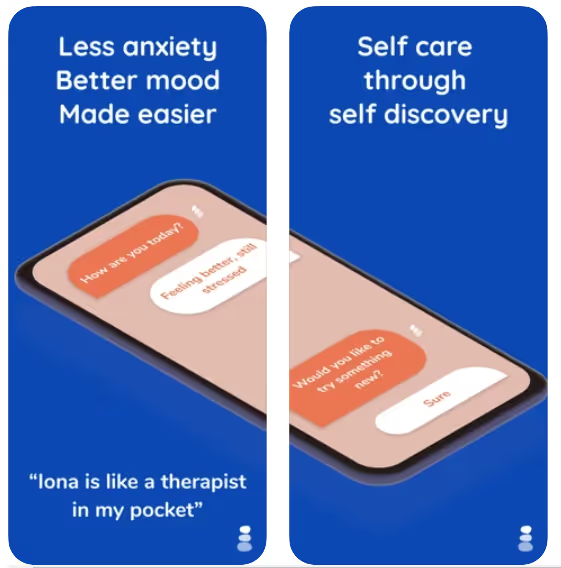
The chatbot helps with the following features...
- Tracking mood and patterns of thinking/behavior.
- Tools and exercises to manage mental health symptoms.
- Scientifically backed plans tailored to help the user and their mental fitness goals.
- Daily gratitude journal.
- Guided mental health check-ins.
- Meditation and mindfulness exercises.
- Increasing emotional awareness and helping to manage difficult feelings.
- Understanding internal dialogue.
- Insights into common thinking patterns and biases.
- A library of helpful concepts and information drawn from CBT.

Everyone's Favorite Personal Nurse, Florence
What started as a personal project grew into an advanced personal nurse chatbot named off of the founder of modern nursing, Florence Nightingale.
German entrepreneur, David Hawig, developed Florence in June 2016 to help remind patients about taking their prescriptions. All you have to do is enter their medicine’s name, quantity, and the time you have to take it.
Since its initial release, Florence now has a plethora of other capabilities even though it’s most popular feature is still it’s reminding capabilities.
The bot can…
- Moderate mood
- Track weight and period cycles
- Send prescription refill reminders
- Give daily health tips
- Find the nearest doctor or pharmacy
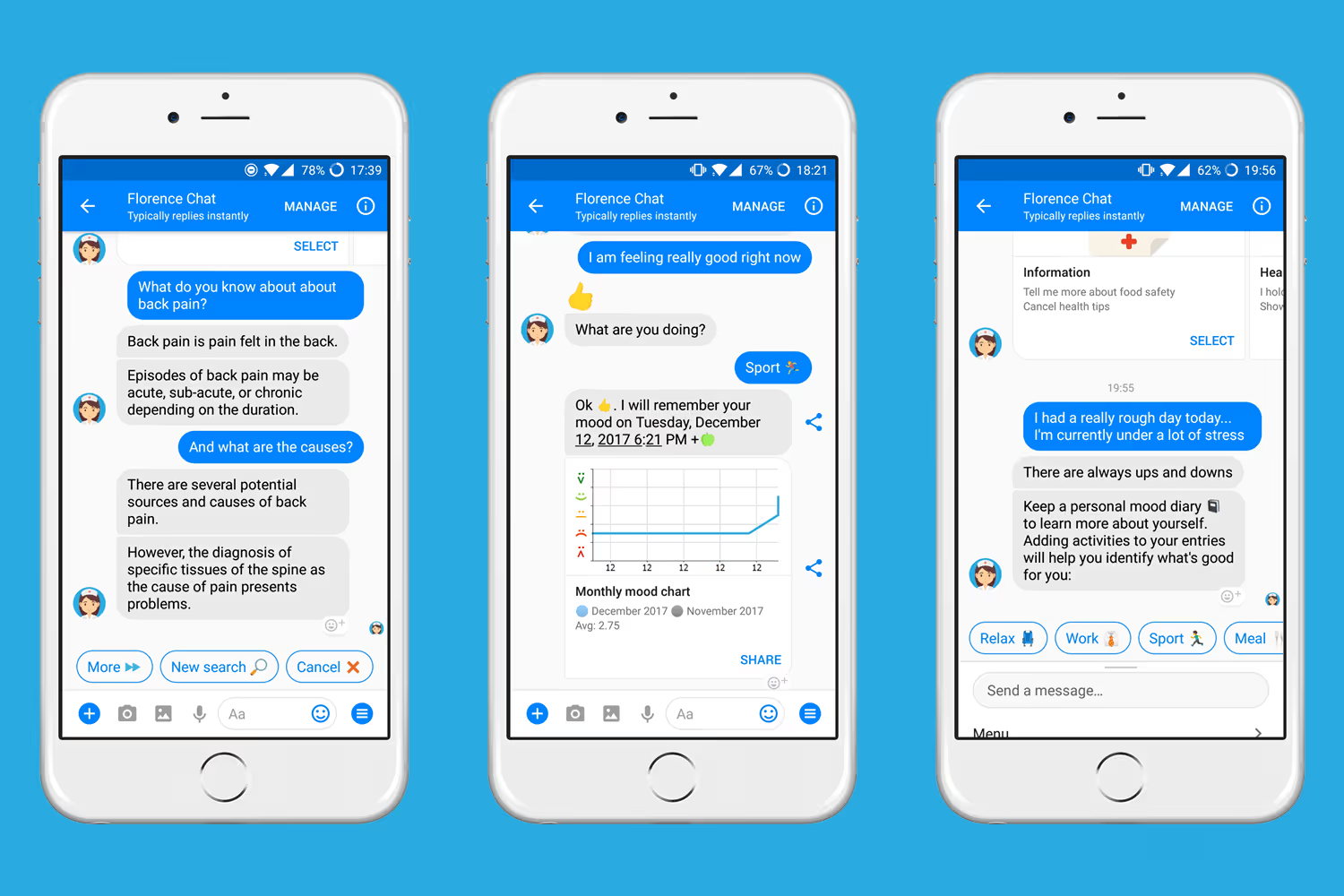
Prescribed Coaching Tips from Ariana
Ariana is another chatbot in healthcare that takes a similar approach to Florence. However, there are a few differences between the two.
First, Ariana’s user base is exclusive. The AI is only accessible to users who are officially diagnosed in order to keep user-abuse to a minimum.
Second, medical content is “prescribed.” Ariana’s distributed by partnerships with pharmaceutical companies. This means that a lot of the conversation had with this bot aligns with the medicine the technology supports.
Third, there are lines Ariana won’t cross in a conversation with a user. If the user begins describing symptoms it encourages them to call a patient support hotline.
These three differences are by design. The founder of the technology, Dr. Carol Wildhagen, wants to make sure that patients who use Adriana realize that it’s not a real human.
Post-Surgery Interviews with HealthLoop
Having surgery is a traumatic experience. In some cases, it’s a life-changing event that may lead to depression. Postoperative depression occurs in 15 - 53% of patients over the age of 65 years. To remedying this form of mental illness, patients need to talk with professionals.
HealthLoop realized this need to evaluate patients in their post-surgical state by creating an interview chatbot.
The technology helps physicians by sending customized patient education information and reminders while in recovery. It helps make patients more aware of how they’re feeling postop by asking them questions on how they’re feeling.
All responses are then reviewed by their physicians. If anything alarming happens throughout the healing process, the doctor can quickly ask the patient to come back into the office.
In one case, HealthLoop helped a physician bring a patient in after they developed a blood clot after rotator cup surgery.
In 2018, GetWellNetwork acquired HealthLoop. The technology was then rebranded to GetWell Loop.

Your Friendly Neighborhood Reminder, Izzy
Who wouldn’t want to talk to a friendly yellow bird named Izzy? Through Facebook Messenger, Izzy helps women keep track of menstruation.
She’ll ask users about period pains, emotional distress, birth control and gives helpful information on health and sexual issues.
The dev team behind Izzy created her with the mindset of providing helpful information to women in a non-judgemental way.
The team’s also enhancing Izzy to provide more information on endometriosis and better pain tracking.
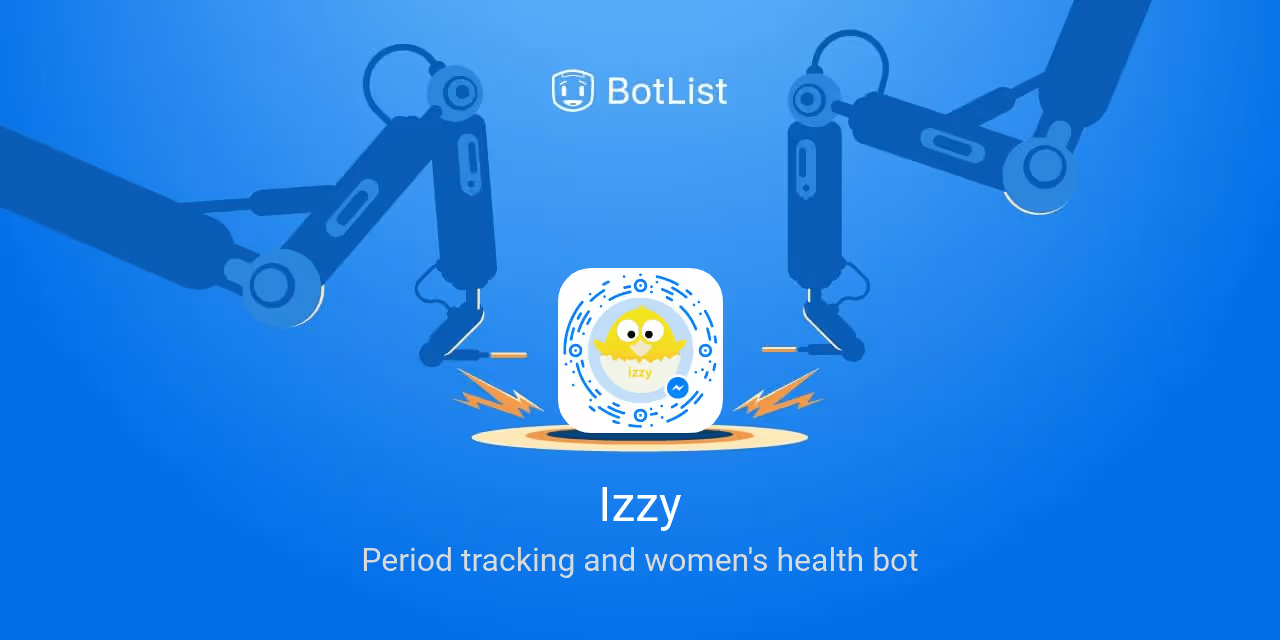
You're Really Going to Eat That? - Forksy
Have you ever wished that you had someone who was always honest with you to keep you on your diet? It’s not for everyone.
How about someone who’s encouraging and keeps track of what you eat through a casual conversation? After all, Kaiser Permanente proved in 2008 that keeping a food journal can double your weight loss.
That’s what Forksy is all about. Forsky is an easy to use nutritional coach AI that integrates with Facebook Messenger.
All you have to do is connect with Forksy and begin telling “her” what you ate. She extracts food names and serving sizes from your messages and record them in a food journal.
What makes Forksy helpful is how she reacts to healthy and unhealthy food decisions. She’ll give you helpful tips based on what you eat throughout the day.
Of course, she doesn’t want to make you feel too guilty when you splurge on a dessert. Instead, she’ll talk about helpful alternatives to try.
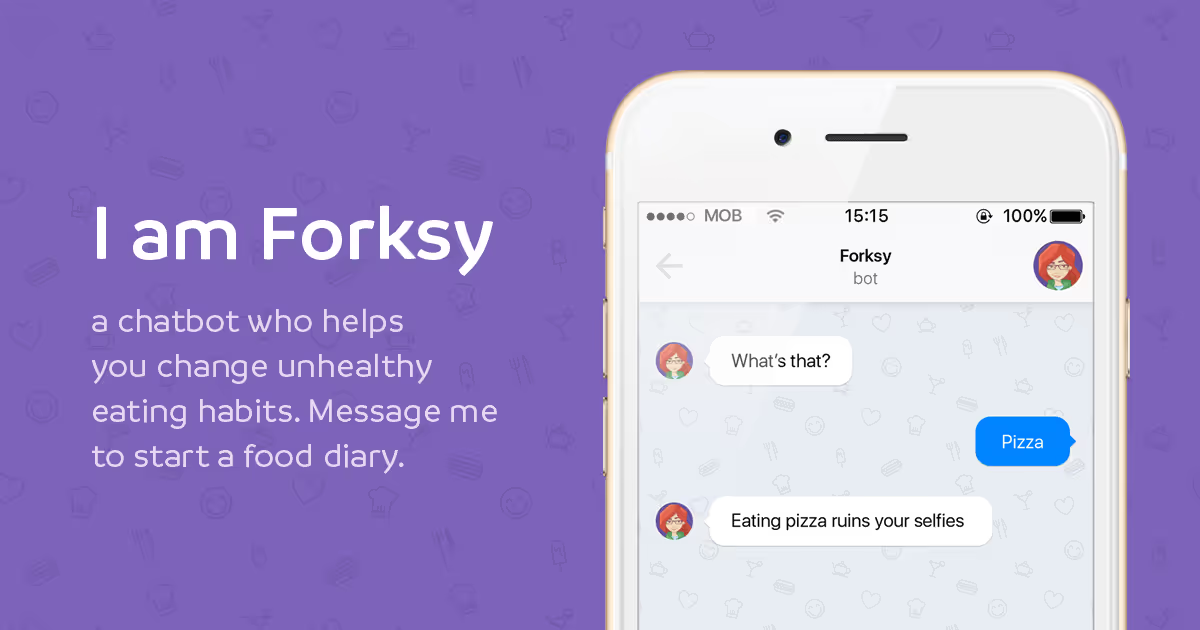
Tell Me Your Woebot
If you’ve checked out the current mental health environment, the statistics might make you say, “...whoa.” Recent headlines read that diagnosis’ for major depression disorder has risen by 33% since 2013.
So how do you help those with depression? One particular chatbot is trying to remedy it by offering a different kind of cognitive behavior therapy (CBT). You can download Woebot on any popular app store to begin chatting with the helpful therapy bot.
Although it may seem strange to open up to a bot, what it can do is impressive. While open, Woebot prompts you to open up by asking how they’re feeling. Once you begin answering, it takes you through self-reflection exercises. These exercises help draw attention to any negative tendencies you may have.
While working with Woebot, it’ll ask you to make a daily check-in commitment for 14 days. After that period, you can continue your sessions.
The best part about Woebot is that you probably won’t have to continue after your first half month with it. That’s the beauty of CBT therapy. After learning the exercises yourself through repetition, you won’t need a bot to help you stay positive.
There’s also strong evidence that CBT works and it’s considered the gold standard of psychotherapy.
Confide in Replika
While we’re on the topic of mental health, more people feel lonely. Present-day, 1 in 5 people in the US report that they feel lonely. This loneliness epidemic isn’t helping the fight against depression and anxiety disorders.
Replika AI is taking an interesting approach toward solving loneliness by trying to establish an emotional connection with you. Once entering the app, you can steer Replika toward the relationship you’d like to have with it.
Replika can be your friend, romantic partner, or mentor. From there you can choose its personality type and design how it looks. After designing the chatbot to your liking, it’s time to build the friendship.
While working with the AI, it understands your feelings and tracks your mood. It also helps with…
- Teach coping skills
- Calming anxiety
- Management stress
- Think positively
- Socializing
No two Replika bots are the same because of its algorithms. The app has over 1 million installs on Google Play.
On-Demand Behavioral Health Coaching with Ginger
If there’s an increase in the number of people seeking mental health counseling then there’s a need for professional behavioral health counselors.
Luckily the number of mental health counselors should increase by 13% by 2030. So why not make these professionals available at all times? That’s where Ginger comes in.
Ginger’s goal is to make behavioral health coaching accessible to everyone. The app takes a similar approach to other chatbots mentioned in the blog post.
To get started, you first send a message in the form of a text through the app. From there the app will connect you with a professional therapist on the other end. Instead of waiting a month to set up an appointment with a therapist, you can talk to one at any time through the app.
This behavioral health app has gained some serious traction. In September 2019, they received $35 million in funding.
With Ginger, you can send a text message through the app
Conclusion
There’s no end to what chatbots may provide us. These helpful, friendly AI’s are so advanced now that there’s no predicting where we’ll be within the next decade.
It’s an exciting time in the healthcare space on both sides. Medical professionals are able to provide people the most convenient care possible through a streamlined system. While patients can boost their overall physical and mental wellness on a daily basis.
These AI-driven robots will thrive in a world that’s continually short on time.
Emphasize your product's unique features or benefits to differentiate it from competitors
In nec dictum adipiscing pharetra enim etiam scelerisque dolor purus ipsum egestas cursus vulputate arcu egestas ut eu sed mollis consectetur mattis pharetra curabitur et maecenas in mattis fames consectetur ipsum quis risus mauris aliquam ornare nisl purus at ipsum nulla accumsan consectetur vestibulum suspendisse aliquam condimentum scelerisque lacinia pellentesque vestibulum condimentum turpis ligula pharetra dictum sapien facilisis sapien at sagittis et cursus congue.
- Pharetra curabitur et maecenas in mattis fames consectetur ipsum quis risus.
- Justo urna nisi auctor consequat consectetur dolor lectus blandit.
- Eget egestas volutpat lacinia vestibulum vitae mattis hendrerit.
- Ornare elit odio tellus orci bibendum dictum id sem congue enim amet diam.
Incorporate statistics or specific numbers to highlight the effectiveness or popularity of your offering
Convallis pellentesque ullamcorper sapien sed tristique fermentum proin amet quam tincidunt feugiat vitae neque quisque odio ut pellentesque ac mauris eget lectus. Pretium arcu turpis lacus sapien sit at eu sapien duis magna nunc nibh nam non ut nibh ultrices ultrices elementum egestas enim nisl sed cursus pellentesque sit dignissim enim euismod sit et convallis sed pelis viverra quam at nisl sit pharetra enim nisl nec vestibulum posuere in volutpat sed blandit neque risus.

Use time-sensitive language to encourage immediate action, such as "Limited Time Offer
Feugiat vitae neque quisque odio ut pellentesque ac mauris eget lectus. Pretium arcu turpis lacus sapien sit at eu sapien duis magna nunc nibh nam non ut nibh ultrices ultrices elementum egestas enim nisl sed cursus pellentesque sit dignissim enim euismod sit et convallis sed pelis viverra quam at nisl sit pharetra enim nisl nec vestibulum posuere in volutpat sed blandit neque risus.
- Pharetra curabitur et maecenas in mattis fames consectetur ipsum quis risus.
- Justo urna nisi auctor consequat consectetur dolor lectus blandit.
- Eget egestas volutpat lacinia vestibulum vitae mattis hendrerit.
- Ornare elit odio tellus orci bibendum dictum id sem congue enim amet diam.
Address customer pain points directly by showing how your product solves their problems
Feugiat vitae neque quisque odio ut pellentesque ac mauris eget lectus. Pretium arcu turpis lacus sapien sit at eu sapien duis magna nunc nibh nam non ut nibh ultrices ultrices elementum egestas enim nisl sed cursus pellentesque sit dignissim enim euismod sit et convallis sed pelis viverra quam at nisl sit pharetra enim nisl nec vestibulum posuere in volutpat sed blandit neque risus.
Vel etiam vel amet aenean eget in habitasse nunc duis tellus sem turpis risus aliquam ac volutpat tellus eu faucibus ullamcorper.
Tailor titles to your ideal customer segment using phrases like "Designed for Busy Professionals
Sed pretium id nibh id sit felis vitae volutpat volutpat adipiscing at sodales neque lectus mi phasellus commodo at elit suspendisse ornare faucibus lectus purus viverra in nec aliquet commodo et sed sed nisi tempor mi pellentesque arcu viverra pretium duis enim vulputate dignissim etiam ultrices vitae neque urna proin nibh diam turpis augue lacus.


.avif)
